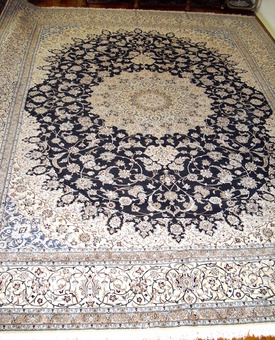New Handmade oriental carpet No. 56631 Nain 6-la Kork Iran 400 x 305 cm

Larger images (will open in new window)
Please click on the thumbnails below for a larger view
| main view |
close-up of corner |
closer view half the rug |
close-up medallion |
back |
 |
 |
 |
 |
 |
| Item Number: |
56631 |
| Name: |
Nain 6-la Kork |
| Country of Origin: |
Iran |
| Size: |
400 x 305 cm |
| Age:
|
new |
| Pile: |
wool (with silk) |
| Design: |
floral / medallion |
| Ground Color: |
dark blue / navy |
| Remarks: |
This is a unique handmade / hand-knotted / traditional oriental carpet
The pile of this carpet is made of wool with silk parts. |
 add to cart
add to cart
More about the provenance Nain 6-la | Iran
This is a real Nain and not a rug with Nain design made in another part of Iran. Nain is located in Central Iran and is the main town of the Nain district. The city is amongst other things proud of a mosque called "Madjed Djomeh" from the 10th century. Nain rugs are of remarkable fineness and therefore have sharply distinguished and clear patterns, you might call them luxury editions of the Persian rugs. The beautiful combinations of white and light blue are characteristic for Nain carpets. They are often traded in Isfahan. The Persian knot is used making them as opposed to the more spread Turkish knot which is more often used with Persian rugs. The fineness of Nain rugs (and only Nain rugs) is indicated by the Persian term "la" meaning "thread" and the number before that determining the number of thread used to twine the yarn. The less threads used for twining the yarn, the finer the yarn and therefore the finer the Nain rug. Nain 6-la rugs usually have a fineness between 480 and 580 knots per square inch or between 750,000 to 900,000 knots per square meter.
The special wool with which this Oriental rug has been made is called "Kork" wool. The Persian word "Kork" means "soft down". This expression is used for particularly fine and soft wool for very high quality rugs, especially for expensive rugs made in esteemed manufactures like e. g. in Kashan. It is common to add the word "Kork" to the provenance name as in e. g. "Kashan Kork".

